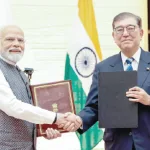As teachers, we have a lot on our shoulders and that literally means teaching students their ABCs and their 1234s. But the kindness and affection that we show in the classroom daily produces more fruit — it helps children see the kind of people they can grow up to be.
What is needless to say is that we have an ocean of talent in the shape of teachers working at government schools across Jammu and Kashmir. This vast pool of abilities in teachers appears at DIETS, High Schools, Higher Secondary Schools and even at IGNOU centers. But little is known about the strengths of these teaching assets.
In multiple columns in this leading paper, it has been my honest opinion that a major section of teaching personnel, from the primary to elementary schools, needs to be shifted from the institutions where they have been since their appointment some two decades ago. The transfer will bear many benefits. One, it will end their “I am the boss attitude” and “my school, my rules way of conduct “. And students’ learning could no more exist down their priority list.
Two, the shift from their schools after this decade-long stay will expose them to newer environs, broaden their outlook and pull them out of the comfort zone. It is human nature that you begin to take things easy when your work faces no critical evaluation at a particular place. Even the spirit of competition dies there; boredom overtakes and academic progress falls. Worse, the vested interest prevails, pushing school – bound duty to the background.
Three, the exit from their initial appointment schools can make these non-transferable teachers understand the importance of punctuality because they will be under pressure to report to duty on time and — leave on time. Also, they will learn to stay on duty throughout the working hours at a non- home school— not leave for home routinely during working hours and return at will. Most importantly once out of their home schools and conditions, these stagnant teachers will avoid attending duty unprofessionally.
Which, in turn, will make them realize the true value of duty and their responsibility towards people. Their priorities should shift to general students ‘ educational achievements. Resultantly, the schools are likely to progress academically. It is no secret that most of these non- moving teachers prefer to do the best for those children they are either related to or are their favorites at schools. So most non-favorite learners suffer. But away from their home schools, these teachers will no longer lord over the underprivileged students. Possible is the end of this predatory behavior. Misleading of social media watching public through school-made cheap videos may also come to end.
Remarkably among this non-shifted category of teaching personnel, we have a significant number of teachers whose way of working and commitment is well recognized. Of their brilliant performance, their colleagues and students are a strong witness. These teachers are a reservoir of talent, a fact which sees some of them deployed out of their home schools to the high and higher secondary schools.
It is these talent -rich educators — 99% among them were degree holders at the time of their appointment — whose sublime teaching – learning performance needs to be utilized to its full potential. As the services of these teachers continue to be non-transferable from decades, they need to identified at the elementary level and tasked to teach at the secondary level keeping in view their subject specialization. This move will only prove beneficial.
First, their availability at the secondary level will meet the requirement of the subject -knowing teachers for all subjects. That will strengthen the academic activities at these institutions. We undoubtedly miss teachers with a specialization for a few subjects at the secondary level. Many high school or higher secondary school going children can be seen in search of tutors for a few subjects, asserting that they do not get good lessons in those books at their schools. Yes, the issue is responsibly and dutifully addressed by the School Education Department (SED) through the deployment of teachers from the middle schools. But this provision needs a reform.
All the post graduate educators, a vast majority of whom are of a Reheber-e-Taleem (R-eT) or Grade -II rank, need to be deputed to teach at the secondary level. This crucial step will allow these brilliant teachers to realize their full potential by teaching the subjects they have a masters degree. Plus, their expertise and knowledge in the subject will be very useful to the students .The latter may no longer need to look for tutors back home.
Also, this step will enable the authorities to utilize the services at the elementary level of the masters and teachers who do not have a masters degree in any subject but are working at the secondary level. This reshuffling has an added advantage: at the elementary level, these experienced masters can well act as head teachers besides shouldering the teaching- learning activity there for the pupils.
A new lease of life into the primary and middle school level work culture can thus be breathed. It has been observed that under a master grade level head teacher/ headmaster, these institutions have often progressed better. The master impartially induces discipline towards duty among the staff members and his/her decisions, in majority of cases, focus on the students’ welfare. A non-transferable teacher rank Head of the Institution ( HOI) generally does more harm than good — he/ she knowingly or unknowingly promotes groupism; ignores good suggestions , imposes wishes and seeks undue official blessings beyond the teaching mandate, throwing the rule of law out of the window.
This atmosphere gives a beating to the academic achievements of students and defeats the very purpose of schooling. Moreover, we lose millions of rupees on imparting trainings, round the year, to the teachers working under an incompetent/ irresponsible HOI. After all, trainings have a noble goal. How can this goal be achieved if you have an HOI who is unable or unwilling to run the institution in line with the codal norms?
Additionally, transferring this non-transferable teaching workforce— who work at the elementary level as R-e-Ts / Grade -II — is bound to eliminate their apparently bored, demotivated, defiant and unhelpful attitude towards duty. That as a result will induce punctuality in them; make them prioritize a student’s academic activities and generate a deep sense of responsibility in them towards the learners’ academic progress. Thus an increase in the enrollment could also be witnessed.
It is appreciable that the SED has made multiple reforms in school education in recent years. Shifting of all categories of teachers, including RETs / Grade -II ones, from elementary schools to the secondary ones and vice versa on need basis, will potentially prove a big reform. The key needs to be a subject – specific degree and — teaching competence of a teacher of any category. Children learn more from who you are than what you teach.
(Author is a teacher by profession and RK columnist. Feedback: [email protected])





